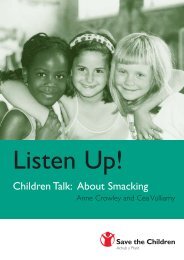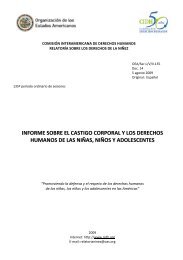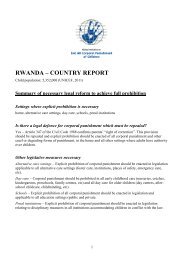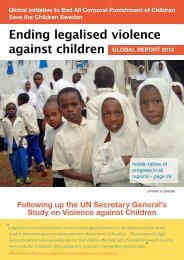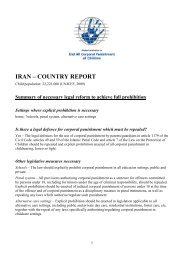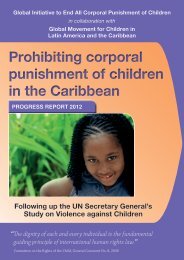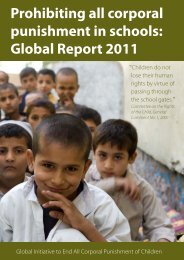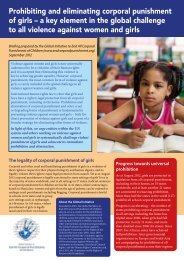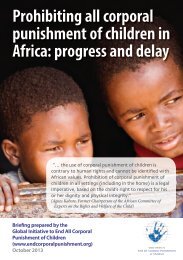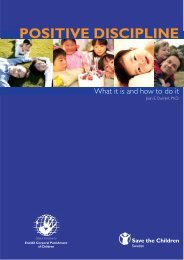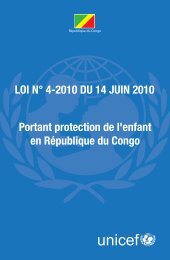Ending corporal punishment of children in Swaziland
Ending corporal punishment of children in Swaziland
Ending corporal punishment of children in Swaziland
- No tags were found...
Create successful ePaper yourself
Turn your PDF publications into a flip-book with our unique Google optimized e-Paper software.
9. ALTERNATIVES TO CORPORAL PUNISHMENTAND OTHER FORMS OF HUMILIATING ANDDEGRADING PUNISHMENTChildren need discipl<strong>in</strong>e, and particularly need to learn self-discipl<strong>in</strong>e. But <strong>in</strong>addition to <strong>in</strong>fr<strong>in</strong>g<strong>in</strong>g on <strong>children</strong>’s rights to human dignity and physical <strong>in</strong>tegrity,<strong>corporal</strong> <strong>punishment</strong> and other forms <strong>of</strong> humiliat<strong>in</strong>g and degrad<strong>in</strong>g <strong>punishment</strong>are <strong>in</strong>effective forms <strong>of</strong> discipl<strong>in</strong>e (as discussed <strong>in</strong> chapter 3). Smack<strong>in</strong>g, spank<strong>in</strong>g,beat<strong>in</strong>g and humiliation are poor substitutes for positive forms <strong>of</strong> discipl<strong>in</strong>e which,far from spoil<strong>in</strong>g <strong>children</strong>, ensure that they learn to th<strong>in</strong>k about others and aboutthe consequences <strong>of</strong> their actions. In the countries where <strong>corporal</strong> <strong>punishment</strong> hasbeen elim<strong>in</strong>ated through legal reform and appropriate public education, there isno evidence to show that the disruption <strong>of</strong> schools or homes by unruly <strong>children</strong>has <strong>in</strong>creased. 49It is also clear that most Swazi <strong>children</strong> who experience <strong>corporal</strong> <strong>punishment</strong> preferto be discipl<strong>in</strong>ed <strong>in</strong> a non-violent manner. Children want teachers and parents totalk to them and expla<strong>in</strong> what they did wrong <strong>in</strong>stead <strong>of</strong> us<strong>in</strong>g <strong>corporal</strong> <strong>punishment</strong>or other forms <strong>of</strong> humiliat<strong>in</strong>g or degrad<strong>in</strong>g <strong>punishment</strong>. 50In addition to law reform, the challenge <strong>in</strong> <strong>Swaziland</strong> is thus to <strong>in</strong>crease awarenessamong adults about <strong>children</strong>’s basic right to be protected from <strong>corporal</strong> <strong>punishment</strong>and other forms <strong>of</strong> humiliat<strong>in</strong>g and degrad<strong>in</strong>g <strong>punishment</strong>, and about the<strong>in</strong>effectiveness <strong>of</strong> these forms <strong>of</strong> <strong>punishment</strong>. Adults should be equipped withalternative models <strong>of</strong> child-rear<strong>in</strong>g that are based on positive and non-violent forms<strong>of</strong> discipl<strong>in</strong>e. It is also important to ensure that <strong>corporal</strong> <strong>punishment</strong> is not replacedwith humiliat<strong>in</strong>g and degrad<strong>in</strong>g <strong>punishment</strong> <strong>of</strong> <strong>children</strong>.In view <strong>of</strong> this and <strong>in</strong> l<strong>in</strong>e with recommendations by the UN Committee on theRights <strong>of</strong> the Child, the Swazi government should <strong>in</strong>itiate and support publicawareness and education campaigns to promote positive, non-violent methods<strong>of</strong> child-rear<strong>in</strong>g. This could be done <strong>in</strong> close collaboration with NGOs andCBOs work<strong>in</strong>g for <strong>children</strong>’s rights, political and traditional leaders, faith-basedorganisations, educational <strong>in</strong>stitutions and <strong>in</strong>ternational donor organisations.Children themselves could play an important role <strong>in</strong> these efforts. However,before embark<strong>in</strong>g on awareness and education campaigns, the governmentneeds to secure f<strong>in</strong>ancial and human resources to implement a programme thatcan be susta<strong>in</strong>ed <strong>in</strong> the long-term. The media could also become a key partner<strong>in</strong> campaigns to raise awareness <strong>of</strong> <strong>children</strong>’s rights and alternative, non-violentforms <strong>of</strong> discipl<strong>in</strong>e.It is also important to keep <strong>in</strong> m<strong>in</strong>d that discipl<strong>in</strong>e is an ongo<strong>in</strong>g process. Thereare no ‘quick fixes’ to develop <strong>children</strong> <strong>in</strong>to human be<strong>in</strong>gs with self-discipl<strong>in</strong>eand respect for other human be<strong>in</strong>gs. S<strong>in</strong>ce <strong>children</strong> are <strong>in</strong>dividuals with <strong>in</strong>dividualcharacteristics and needs, it is important to f<strong>in</strong>d alternatives that are suitable for the27



